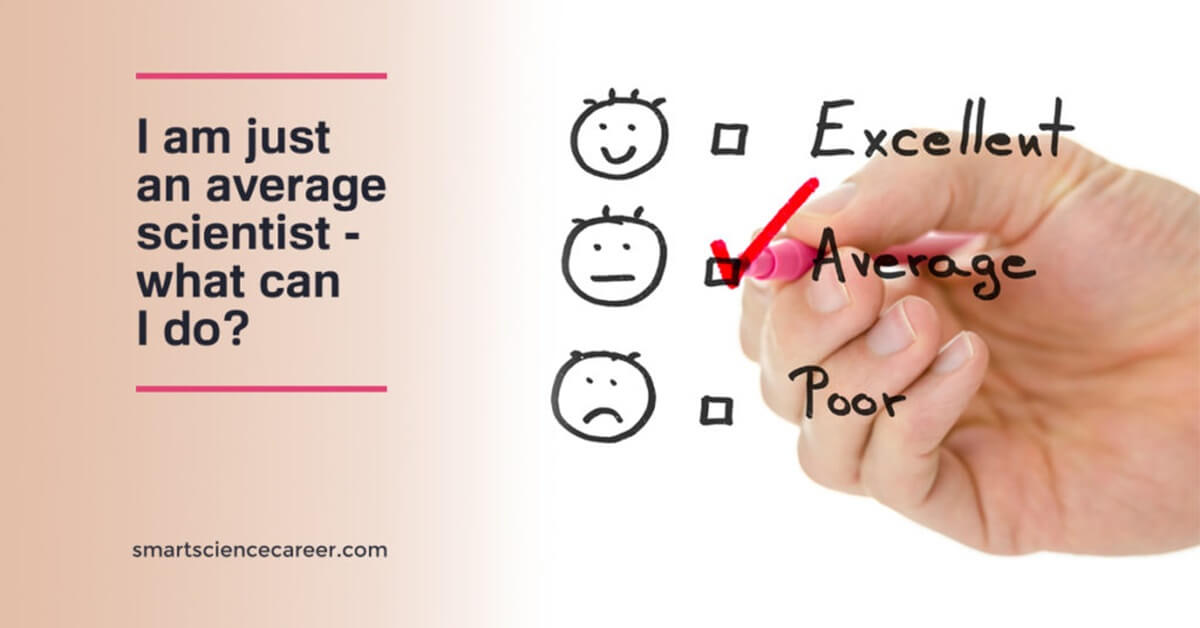I am just an average scientist – what can I do?
You see these big science stars who publish in Nature and Science. They have huge grants, a massive machinery of high-class technology, and a big team of highly ambitious postdocs and PhD students who hope to publish in Nature or Science. However, you are not like that. You might feel just as an average scientist. How do you handle feelings of inferiority when you compare yourself to these science stars? And how do you become better anyway?
Is excellence a smart goal?
When we organize courses for PhD students and postdocs “to become excellent in research,” many of them are overwhelmed by the aim of “scientific excellence.”
A handful of young researchers have a burning ambition to become excellent – mostly, they succeed. Unfortunately, the large majority tends to interpret “excellence” as an unrealistic or even unattractive aim.
During the last decade, I realized that a few simple strategies could help young researchers to overcome the feeling of being overwhelmed by the concept of “excellence.”
Change your perspective – scientific stars are outliers!
The first and most important step is to stop comparing yourself with persons who are much more experienced and have worked much longer in their careers. If you are a young scientist, do NOT compare yourself with a scientific star who has published high-impact papers since the late eighties.
It is impossible NOT to get depressed when you do that. You must realize that these scientific stars are outliers. In other words, most scientists are, by definition, “average” and find themselves in the middle of the Bell curve. Do not compare yourself with outliers.
Is it OK to be an average scientist?
Yes – because in most contexts, you are average. This is the definition of a normal distribution.
When I talk to a mycology expert, I am average because I have only general knowledge about mycology. When I talk to an HPLC expert, I am average because I have only general knowledge about the subject.
In my own field, I might be an expert. However, when talking to an expert who has worked in this field for 20 more years, I am still average.
Thus, find peace with the idea, to be average in nearly every field.
Do not call yourself “just average”!
Defining yourself as “just average” or “just mediocre” is a big psychological mistake. You may argue that this is just a way of being modest and humble. However, in most cases, it is interpreted as a sign of low self-esteem.
In addition, people tend to accept negative judgments about you – especially when you make them yourself. Thus, never call yourself “just average.” At least not in public :).
Most scientists envy the big science stars – but would you pay the price for such a success?
What are the opportunity costs?
Many scientists feel perfectly fine with their lives and their ambitions. They do not want to pay the price to become a science star in academia or industry. It is a hell of a lot of work, often incompatible with a healthy family life and other interests, e.g., culture or sports.
A high level of focus is necessary for a high-level career, which has high opportunity costs (when you focus on one activity, you cancel out other activities that may have similar value).
A strong focus, high motivation, endurance, hard work, and long hours are necessary for most high-level careers. Nevertheless, most people who have passed a midlife crisis consider their career as just one element of many for a fulfilled life.
Thus, make a conscious decision whether you want to pay the price for your chosen career.
Are there other options?
Definitely!
There are many researchers who are experts in their field and have found a stimulating and/or comfortable niche and consider their career as ‘successful’ although they do not publish in high-impact journals regularly. They are experts in their field and find it OK to be an average scientist or “generalist” in other fields. They often successfully negotiate an excellent salary.
Interestingly, many successful researchers publish just one or two high-impact papers and change their publication strategy after being tenured.
This does not necessarily mean that they become lazy or lose ambition. Quite often, they simply developed a broader perspective and considered high-impact factor hunting as an unhealthy strategy for scientific productivity or quality.
In contrast, they work continuously on research questions they find relevant and develop a broader oeuvre. This may lead to high-impact factor publications, but they are not the primary motivation.
However, this attitude is much easier to develop when you are a tenured professor and have a secure position until retirement :).
How to become a better scientist?
Excellence is difficult to define because there are many different types of excellence or success in science.
To get a clear view of your wishes, talents, and possibilities, you must first define what a successful career in science means to you and which parameters of excellence in science you find essential.
Understanding your until-now-unreflected ideas about excellence is also helpful to understand whether you have internal conflicts that impair your motivation.
Develop a long-term perspective
To build a successful career in science, you need a long-term perspective and strategy. Many researchers do not have a 5-year or 10-year plan for their career, which makes intelligent long-term decisions not very probable.
Choose one of the million books about identifying a mission and defining goals (e.g. the classic First Things First by Stephen Covey or Vivid Vision by Cameron Herold [affiliate links]). This will help you more than anything else to pursue a career you care for.
Your environment defines your performance – choose it well!
Jim Rohn made the famous quote, “You are the average of the five people you spend the most time with.”
Most people spend most of their time at work…
If most people around you focus on teaching or administration and hate research, you will sooner or later tend to focus on teaching or administration as well – or leave the environment.
If you are working in a very ambitious environment with a lot of technical support, intellectual stimulation and sufficient peer pressure, it is probable that you adapt your working behavior. Depending on your long-term strategy, you should choose your working environment wisely.
Make a conscious choice!
Most young researchers do NOT want to work in a highly ambitious academic environment
- with seven competitive postdocs
- who all work on the same big project and
- who all want to be the first author on the next Nature paper.
Consequently, they are going to find a job in an environment which is more appropriate for them. For example, if you want to help patients with a specific disease, you do not necessarily have to work in a research group which is strongly focused on publishing Nature and Cell papers. Maybe it is much better to join a very clinically oriented lab which focuses more on the day-to-day needs of patients.
Decide whether you love to solve scientific riddles or enjoy building complex instruments, whether you love writing texts and/or manage a team.
Some jobs are better suited than others for your personal combination of a successful career and a healthy family life.
These are important choices which have to be made consciously to avoid feelings of inferiority and to pursue a career you enjoy.
Acknowledgments
I have used AI systems, including Grammarly, Google Gemini, and ChatGPT, to enhance the English and comprehensiveness of this article. This post may contain affiliate links, meaning I get a small commission if you decide to purchase through my link. Thus, you support smartsciencecareer at no cost to you!
Recommended reading
The following articles may also interest you:
- Is being a professor worth it?
- What is a postdoc?
- Should I quit my postdoc?
- How long does it take to complete a doctorate?
- How to create a leadership action plan
- How To Write Faster: 19 Efficient Ways To Finish My Publication
- 28 Tips to Get More Citations for Your Publications
- Corresponding author versus senior author – what is the difference?
- 20 Strengths and Weaknesses of Leaders in Science
- How to become an expert in your scientific field?
- Career or contribution
- Am I good enough for a career in science?
- I have no idea where I will be in two years
- Will I find a job as a scientist?
- Assistant professor and associate professor – what is the difference?
- What is a Reader at a university?
- What is tenure?
- Why salary matters in science careers
- How to ask for a letter of recommendation?
- Best Books on Communication
- Best books on salary negotiation and getting a raise




Thanks for addressing an issue that has been occupying my mind for the last few years! It’s good to see all tips I got over the years summarized nicely here. Indeed, we as (young) scientists need to be conscious of our own responsibility in our career development. But deciding what we want, both professionaly and personally, is difficult. My advice: find a mentor in your surroundings that you admire and have the courage to talk with him/her openly about your fears, doubts and choices you face. Discussion and reflection will help you develop a suitable career path.
This is a very relevant post for many of us. I think it is okay to be ambitious, but this blog made me realise that we should not be too harsh on our self. What is an eyeopener to me is the concept by Jim Rhone that “you are the average of the five people you spend the most time with”: If you have been in labs that have never published in Science or Nature, it is rather unlikely that you would be the first to change this. Some part is in our career is luck, but by making a conscious choice early we can create the right environment to become very lucky.
Thanks a lot for your comment!
While becoming published in a scholarly journal may be beyond what many of us will achieve, I don’t think that is what is meant by striving for excellence. A scientist can still strive for excellence by ensuring that he takes into account details and scientific principles, that she measures exactly and precisely, that contingencies and alternate hypotheses are accepted, addressed, and accounted for, and that all ethical measures are included in research. When one conducts research, ensure that it is new or that the design of the experiment is clean and concise. Don’t be lazy in developing new hypotheses or accepting the status quo.
Getting published or getting rewards are merely the end results of excellence, not markers of the excellence itself. Once we realize that the method is the ends, then we can all achieve excellence.
Dear Bob, thanks a lot for pointing this out – indeed I have not distinguished clearly between the “way” (excellent methods etc.) and the “results” (rewards, impact factors) in this post. Indeed, this is one of the big problems of bibliometric measures – they make us a bit blind for the quality and relevance of the research.
This article was very enlightening to me. While no longer a “young” scientist, but also not an “old” one either, I wish that I had chosen my doctoral supervisor along the lines described in this blog. Instead, my supervisor had 25-30 students, and -while very well connected- was on record for not caring about what happened to his doctoral students after they graduated.
So for all of you who have yet to decide: be very careful about this major decision. Speak with FORMER students who have already graduated from that research group.
Thank you so much for this comment. Yes, indeed, talking to FORMER PhD students is a great advice.
Nice article… Although most of the Phd’s think there is scarcity of jobs .. But we need to be more consious after graduating.. We need to ponder about our interests and long term career aspirtations. If we are interested in industry, think twice about going for postdoc in case you get some offer… Its much better to try for industry position rather than joining as postdoc.. Go for it only if you are planning to join academics.. Think about long term aspirations rather than short term momentary benefits…
Such a refreshing article, it is reassuring to realise not everyone can be or has to be a science superstar. Thank you
Interesting article. That’s true. Sometime, Running after excellence and a unclear ambitions or goals, we missed out the real fun of life. A balanced life ( family, social, sports) with a good level of research expertise in your field of interest would be more satisfactory to me in the long run.
Becoming excellent in your niche is within your control, but often external validation of that excellence (awards, prizes, fame, notoriety, etc.) is due largely to luck. Many excellent people are unknown, and many worthless one are famous. I’m planning to take charge of being excellent, and let whether or not I have ‘superstar fame’ and recognition to chance.